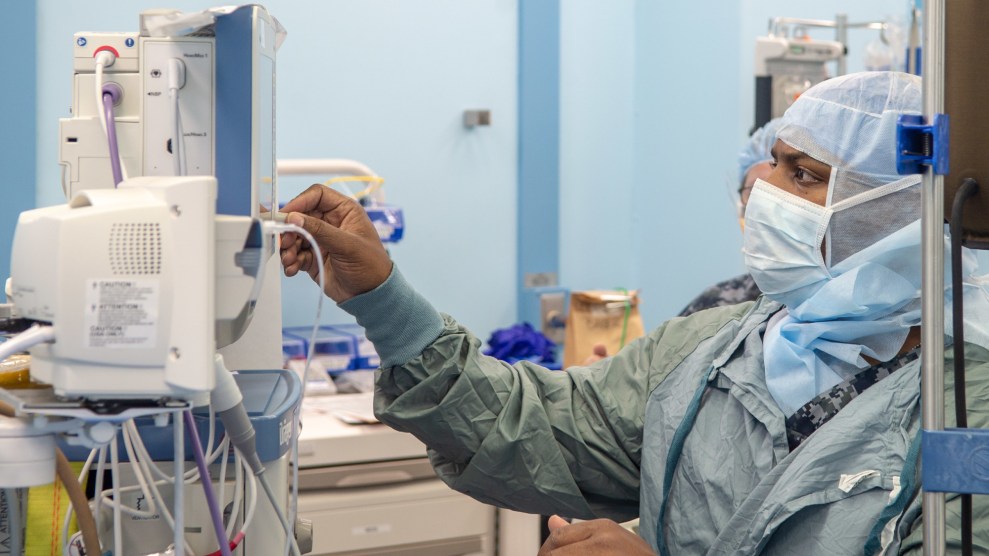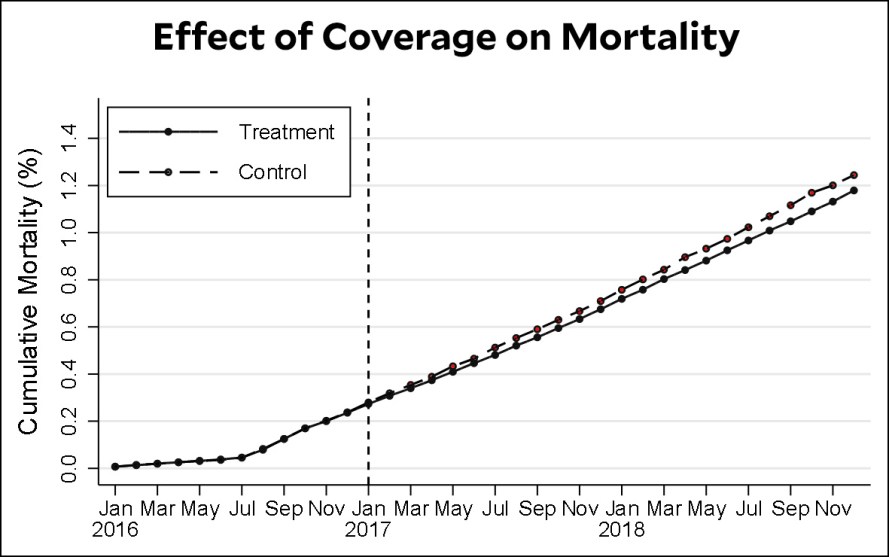
Zuma Press.
This story was originally published by Undark and is reproduced here as part of the Climate Desk collaboration.
Last December, a young patient was admitted to Nationwide Children’s Hospital in Columbus, Ohio, after several medications had failed to quell the child’s relentless seizures. A hospital pediatrician, Vignesh Doraiswamy, consulted with neurologists and then tried a different drug. The child had fewer seizures, became more interactive, and was ready to go back home, says Doraiswamy. But there was a problem: The patient’s insurance company refused to authorize the new medication for the parents to administer. The family had to remain in the hospital for at least two more days, Doraiswamy recalls, while the decision went through an appeals process.
Doctors have long asserted that prior authorization—the need to get approval from the patient’s insurer before proceeding with treatment—causes delays that can hurt patient care. In an American Medical Association survey conducted in December 2021, one-third of physicians reported that such delays have caused at least one of their patients to experience a serious problem, such as hospitalization, the development of a birth defect, disability, and even death. In that same survey, more than 80 percent of surveyed doctors said patients at least sometimes abandon their recommended treatment because of prior authorization hassles. Just over half of the physicians who treat adult patients in the workforce said prior authorization has interfered with patients’ ability to do their jobs.
Prior authorizations also exact a toll on doctors, who say the paperwork has gotten out of hand. The average physician must now seek approval for dozens of prescriptions and medical services each week, an administrative burden that contributes to burnout and costs physician practices an estimated $26.7 billion in time each year.
Perhaps counter-intuitively, prior authorization is one of several strategies that insurers use to reduce wasteful medical spending. (Other strategies include patient cost-sharing and requiring patients to try low-cost drugs before the insurance company will pay for a more expensive therapy.) These strategies can discourage the use of inappropriate and overpriced medications and promote the use of better options. But, as drug prices rise, insurers are intensifying prior authorization requirements and physician practices have built up a huge infrastructure to fight for the drugs they want to prescribe.
Frustrated physicians are turning to state and federal legislators, hoping elected representatives will force insurers to curtail the crushing burden of faxes and phone calls needed to get permission to do what physicians think is right. In 2021, Congressman Ami Bera, an internal medicine physician, joined three colleagues to introduce a bipartisan prior authorization reform bill. Nearly 300 members of Congress have since signed on to the House bill or a companion bill in the Senate.
(The AMA, as well as health insurance companies and their trade groups, donate to both major political parties and are among the top spenders in lobbying Congress.)
Bera says that, since the vast majority of prior authorization requests are eventually authorized, insurers’ overzealous use of the strategy merely delays care and wastes physicians’ time instead of saving the health care system money. With the help of legislation like his, Bera said, “We could actually move the pendulum back towards doctors taking care of patients.”
The idea that insurance companies could influence how patients should be treated emerged in the 1980s, when insurers began requiring pre-approval for some hospital admissions and high-cost procedures before they would agree to pay for them. In the ensuing decades prior authorization was extended to new high-cost drugs.
The anti-seizure medication that worked for Doraiswamy’s patient is expensive. But in recent years, some insurers have started requiring prior authorization even for low-cost generic drugs, said Andrew Spector, a neurologist who specializes in sleep medicine at Duke Health. “And it’s unclear why.”
According to AHIP, a trade group formerly known as America’s Health Insurance Plans, the goal of prior authorization is to improve the quality of care, protect patient safety, and avoid inappropriate care. In an email to Undark, spokesperson Kristine Grow wrote: “Patients deserve the most effective, safest, and most affordable care. That’s what prior authorization helps deliver.”
Insurers say their efforts are working: 91 percent of health-plan respondents to a 2019 AHIP survey said prior authorization had an “overall positive impact” on the quality and affordability of care, and 84 percent said it positively impacted patient safety.
When he was a practicing pediatrician, Thomas Schenk was as annoyed by prior authorization hassles as most doctors are. But when he became chief medical officer for a regional health plan in western New York, seeing the claims filed by physicians gave him a new perspective. While most physicians do follow evidence-based guidelines and request only the drugs and services their patients need, not all of them do so. For example, doctors who rarely see patients with migraines are likely to order more tests, perhaps more than are warranted, to confirm a diagnosis than doctors with more experience, he said.
And the addition of high-cost equipment—say, a magnetic resonance imaging machine—inevitably leads to more frequent use. “If a practice buys a new MRI, there will be an increase in MRI orders” by the practice’s physicians, said Schenk, now chief medical officer at a health technology firm.
More fundamentally, prior authorization helps control wasteful spending just by existing as a process, he said. Knowing that an insurer will balk at approving a costly brand-name drug if a lower-cost generic is effective, many doctors will automatically choose the generic to avoid a prior authorization fight.
Physicians and insurers do have some common ground. Insurers agree that prior authorization approvals can be burdensome for everybody involved. Many physicians agree that prior authorization can be appropriate for some costly drugs or procedures that should only be used in limited situations. In fact, in 2018, AHIP, the American Medical Association, the American Hospital Association, and several other major industry groups signed a consensus statement attesting to their shared commitment to improve prior authorization processes.
But there is no consensus that anything has improved since then. “It really appears that the number of cases where we have to do a prior auth and the kind of delayed tactics that are being applied through the prior auth system really appear to have gotten worse to me,” said John Ratliff, a spine neurosurgeon at Stanford Medicine. “That’s my perception as an individual practicing physician, but I also hear it from our surgery schedulers who run into many more challenges with getting surgeries approved, and I hear it from other neurosurgeons around the United States.”
The Medical Group Management Association, a trade group for physician practices, polled its members in 2019, a year after the consensus statement. Ninety percent said prior authorization requirements had increased. In its latest survey, conducted this spring, 98 percent said the situation had gotten worse or stayed the same over the past year.
The burden of prior authorization on individual physicians varies greatly, depending on the medical specialty, the insurance companies they work with, and other factors. The AHIP survey found that the health plans covering the vast majority of enrollees limit prior authorization to fewer than 10 percent of prescription medications and less than 25 percent of medical services. But over a quarter of the drugs covered by Medicare Part D plans—private prescription-drug insurance for people 65 and older—required prior authorization in 2021, up from just 8 percent in 2007, according to the federal government. For certain classes of drugs, including antidepressants and multiple sclerosis treatments, a majority of drugs require prior authorization.
Physicians decry the quantity of authorizations they are forced to request and the lengthy process this entails. Prior authorization isn’t just a quick phone call to the insurance company and an immediate answer; rather, it’s often a weeks-long tug-of-war in which only the insurer knows the rules of the game, according to Jack Resneck Jr., a dermatologist in San Francisco and president-elect of the American Medical Association.
For starters, doctors often do not know that prior authorization is required for a drug until the pharmacy calls to say the insurer has rejected the claim. Then the physician or their staff must submit documentation to justify the request, but each insurer has its own forms, processes, and criteria.
Although some insurers use electronic prior authorization systems, cumbersome faxes and phone calls are the most common methods of making a prior authorization request. Physicians or their staff members are routinely on hold for 20 minutes or more for a prior authorization call, according to the American Hospital Association; many health plans do not have anyone to field calls on evenings or weekends, leaving patients stranded in the emergency department or hospital bed, waiting for the insurer to decide what care will be delivered.
The resources needed to deal with those requests adds up. The University of Utah Department of Dermatology, for example, employs two full-time and eight part-time employees specifically to deal with prior authorizations. An analysis of a single month, September 2016, found that the department spent almost $6,000 in administrative costs for prior authorizations.
Doctors also lament that prior authorization rules are contradictory. Insurers say they use evidence about the safety and efficacy of a drug or service to make their decisions about what to pay for, but they do not agree on what constitutes appropriate care. For example, HIV pre-exposure prophylaxis, or PrEP, is highly effective in reducing HIV infections, and most insurers do not require prior authorization for its use. But 37 percent of plans in the South do require prior authorization. In the Northeast, just 2 percent of insurers do so.
Ratliff, the spine neurosurgeon, was scheduled to operate on a young veterinarian suffering terrible pain caused by herniated discs—until the insurer declined the request. The patient “couldn’t hold her head in the right position to be taking care of animals,” he said. “So she’s out of work.”
After a month’s delay, the insurer authorized the procedure. “It’s not like these procedures are getting denied,” he said. “It’s just roadblocks that are being put up that delay care.”
Doraiswamy, the hospitalist in Columbus, agrees. He eventually got approval for the drug that relieved his young patient’s seizures, just as he knew he would. “The prior authorization process really is just a lot of bureaucracy, red tape, and headaches,” he said. “I see a lot of children and their families who really suffer through delays in care. It wouldn’t be so frustrating if almost universally the meds didn’t get approved at the end of the day anyway.”
Indeed, the majority of prior authorization requests are approved, according to physician and hospital surveys. The University of Utah Department of Dermatology found that 99.6 percent of requests for procedures in September 2016 were approved, along with the majority of medications.
Additionally, many requests that are denied should have been approved, according to a new report from the Office of Inspector General for the Department of Health and Human Services. Its investigation of Medicare Advantage plans—a privatized type of Medicare coverage for people 65 and older—during a single week in June 2019 found that 13 percent of their prior authorization denials were for services that should have been covered.
And even requests that are initially denied are often approved upon appeal—a phenomenon that makes some physicians believe that prior authorization delays are a financial game for insurers, who hold onto their money while the prior authorization process plays out. “Every delay that they can throw at us is another day that they haven’t had to pay for the drug,” Spector said.
In written comments, AHIP’s Grow said prior authorization helps avoid unnecessary medical spending and abuse that can make insurance premiums less affordable: “Let me be clear: Prior authorization helps save money for patients and consumers—not for health insurance providers—and protects the safe care of patients.”
At the request of patient and physician advocates, 41 states are considering or have taken action to reform prior authorization. In 2021, for example, Texas lawmakers created a system that exempts physicians from preauthorization if at least 90 percent of their requests for a given service are approved over a six-month period.
But state laws have limited effectiveness because insurers change their authorization rules so frequently and because drugmakers are producing such expensive therapies, said William Soliman, founder of the National Board of Prior Authorization Specialists. “It’s going to be a challenge to try to legislate in a meaningful way to try to alleviate the burden on patients,” he said.
Ratliff chairs the Washington Committee of the American Association of Neurological Surgeons and Congress of Neurological Surgeons. His group supports a federal response and is pushing Congress to pass Rep. Bera’s bill, the Improving Seniors’ Timely Access to Care Act. The American Medical Association, the American Hospital Association, and more than 400 other groups also support the bill.
Among other things, the reform bill would require some insurers to use electronic prior authorization programs and render immediate decisions for certain prior authorization requests. Insurers would have to identify all the items and services for which prior authorization is required and list the documentation needed to support any request.
AHIP did not respond to a request for comment on the bill.
The proposed legislation applies only to insurance companies that offer Medicare Advantage plans because Congress has more direct authority over the Medicare program than private insurance companies. But Ratliff and other advocates think that, if insurers are forced to adopt new ways for their Medicare Advantage business, they will apply the same processes to their other plans.
Meanwhile, Spector is waiting impatiently for relief. He recently received a copy of a denial letter an insurance company sent to one of his patients. The letter explained that the authorization had been denied because the requested medication is only approved for narcolepsy. The letter went on to say, Spector said, “‘Your doctor submitted a claim and said that you have narcolepsy.’”
“It’s as ridiculous as it sounds,” Spector wrote in a follow-up email to Undark. “They actually denied the claim for narcolepsy saying it would only be approved for narcolepsy. Human error? Malice? Incompetence? I can’t explain it.”














